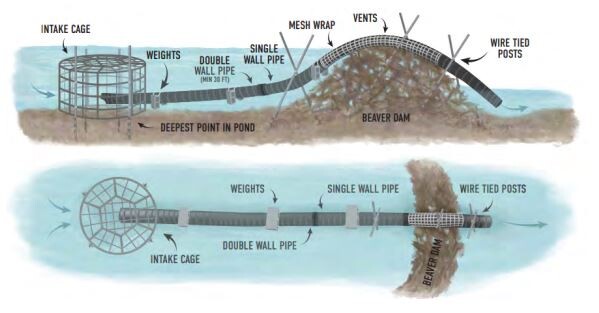Image

After working through several “typical” hearings and other matters last Thursday, Jan. 26, the Conservation Commission took a somewhat different tack, hearing from the Town itself, in the person of Derek Adams, Stormwater and Environmental Affairs Coordinator, regarding the significant threat to the town from – beavers.
Protected from private hunting and trapping for many years, the clever critters are ever on the hunt for places to build a dam, and when they do build a dam, it can cause inconvenience or property damage to neighboring humans. In the case of the town, the additional concern includes the potential to damage culverts and roadways.
Adams laid out the situation in a letter submitted to the Commission, quoted in part, below:
The Town of Franklin Department of Public Works is tasked with ensuring the protection of publicly owned infrastructure. In recent years, a generous portion of this task has been spent mitigating beaver blockage and impacts to Town infrastructure, especially at the Forest Street culvert, Culvert 105A, conveying Dix Brook from the south.
In response to a residential inquiry, Town of Franklin Public Works personnel breached the Culvert 105A blockage, in addition to two upstream beaver dams, by hand prior to submitting this RDA. This is exempt work authorized previously by a Board of Health Emergency Authorization. Subsequently, the Town also mitigated the infrastructure hazard by lethally trapping the responsible beavers. While temporarily effective, this approach is no longer sustainable and the Town would like to find a more efficient and effective solution for the third beaver dams persisting within Dix Brook adjacent to the property located at 4 Abbey Lane.
It is my opinion that installing a flow device, otherwise known as a “beaver deceiver” at this location is the best course of action.

(Beaver Coalition, 2022)
Implementing minimal-impact engineering controls will be more effective and less disruptive to the natural environment, while also successfully mitigating the hazard.
In addition to alleviating the burden of resources that have historically been dedicated to the breaching of dams, there is also a financial benefit to using engineering controls. Trapping the beavers is only a temporary solution, as the absence of beavers at any given location will once again become inhabited by other nomadic beavers. The persistent nuisance of periodically trapping beavers is not financially sound, and can be sustainably solved by installing a flow device.
The dam adjacent 4 Abbey Lane presents a direct, recognized hazard to Culvert 105A: should this beaver dam fail, it will release an uncontrolled surge of water toward the culvert. Such an occurrence creates both environmental and public safety concerns. As the surge conveys a significant amount of energy in the form of water pressure, erosion along the Bank of Dix Brook will displace soils, while simultaneously elevating and conveying dislodged fibrous vegetation (branches, logs, etc). This mass of organic and inorganic material will be channeled directly toward Culvert 105A; at which point the threat of damage to publicly-owned infrastructure becomes evident. Damage to the culvert from the aforementioned would undermine the integrity of the roadway which is supported by the culvert. This situation must (and can) be avoided by the installation of a flow device at the described upstream location.
The purpose of this Beaver Deceiver Installation Project is to install sustainable, minimal-impact engineering controls, “beaver deceivers”, to prevent infrastructure damage due to beaver activities, while simultaneously promoting and encouraging the ecosystem services beavers provide to wetland ecosystems. In doing so, this Project aims to ensure the future protection and success of the local beaver population species, their ecological interactions with their surrounding environment, and the efficiency and success of local stormwater infrastructure.
After some discussion and additional information from Conservation Agent Breeka Li Goodlander, the Commission approved the project.
Later, we asked Goodlander how much of a problem Beavers are in Franklin. She said, there were 18 beaver incidents, typically involving lethal removal and/or dam breaching, across Franklin in the last calendar year.
Goodlander said the use of ‘beaver deceivers’ is becoming more widely accepted in the region and she referenced a
20-year study from Billerica, MA which provides evidence of significant cost savings for municipalities when installing flow devices versus lethal removal of beavers.
The above mentioned study, and much else beside on beavers and beaver control is available at the Beaver Institute.